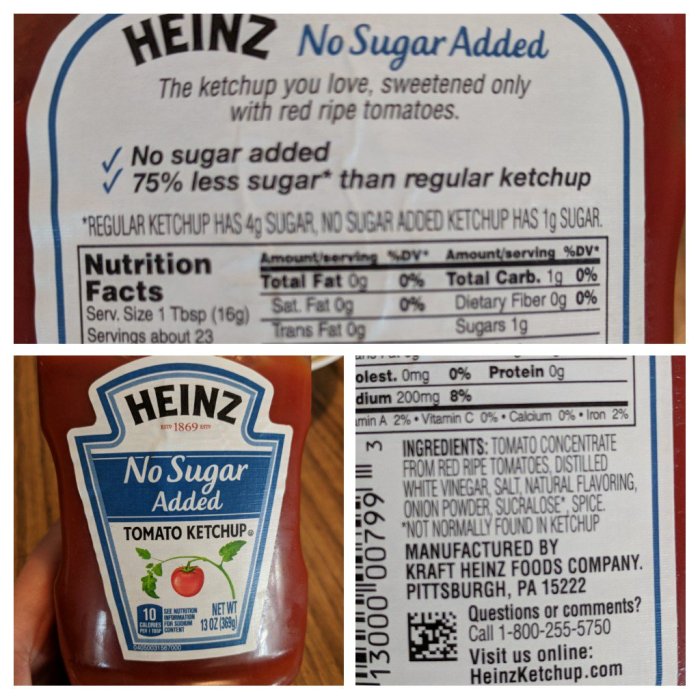Heinz Ketchup Nutritional Composition
Heinz ketchup nutrition facts – Heinz ketchup, a ubiquitous condiment, contributes to the flavor of many dishes. However, understanding its nutritional profile is crucial for making informed dietary choices. This section details the macronutrient and micronutrient content of a typical serving, along with a discussion of its sugar content and potential health implications.
Macronutrient Breakdown per Serving
The following table presents the macronutrient composition of a single serving of Heinz ketchup (approximately 1 tablespoon, or 15 grams), based on average nutritional information. Values may slightly vary depending on the specific batch and manufacturing processes. It’s always recommended to check the nutrition label on the purchased bottle for the most accurate information.
| Nutrient | Amount per Serving | Nutrient | Amount per Serving |
|---|---|---|---|
| Calories | 15-20 | Total Carbohydrate | 4g |
| Total Fat | 0g | Dietary Fiber | 0g |
| Saturated Fat | 0g | Total Sugars | 4g |
| Trans Fat | 0g | Added Sugars | 4g |
| Cholesterol | 0mg | Protein | 0g |
| Sodium | 100-160mg |
Micronutrient Content per Serving
While Heinz ketchup is primarily composed of macronutrients, it does contain small amounts of certain micronutrients. These amounts are generally not significant enough to contribute substantially to daily nutritional needs.
The following list details the micronutrients present in a typical serving, again noting that values may vary slightly:
- Vitamin K: Trace amounts
- Vitamin A: Trace amounts
- Iron: Trace amounts
- Potassium: Trace amounts
- Other vitamins and minerals: Present in trace amounts or negligible quantities.
Impact of Sugar Content on Health
Heinz ketchup’s significant sugar content, primarily in the form of added sugars, warrants consideration. Regular consumption of high-sugar foods and drinks is linked to various health issues, including weight gain, type 2 diabetes, heart disease, and tooth decay. While a single serving of ketchup may not pose a major threat, frequent and excessive intake can contribute to these problems over time.
Understanding Heinz ketchup nutrition facts is crucial for mindful eating. A comparison with other condiments, such as checking the flank steak nutrition facts for a balanced meal, helps put its sugar and sodium content into perspective. Ultimately, knowing the Heinz ketchup nutrition facts allows for informed choices in managing your overall dietary intake.
Moderation is key. Individuals concerned about their sugar intake should monitor their ketchup consumption and consider opting for low-sugar or sugar-free alternatives, if available. Maintaining a balanced diet and regular physical activity are essential to mitigate the potential negative health effects associated with added sugar consumption.
Comparison with Other Ketchup Brands

Choosing a ketchup brand often comes down to personal preference, but understanding the nutritional differences between brands can be helpful for informed decision-making. This section compares Heinz ketchup to two other popular brands, highlighting variations in key nutritional components and potential implications for consumers. We will focus on calories, sodium, sugar, and total fat content for a direct comparison.
Nutritional Comparison of Leading Ketchup Brands
The following table presents a comparative analysis of the nutritional information per serving (typically one tablespoon) for Heinz, Hunt’s, and Del Monte ketchups. Note that these values can vary slightly depending on the specific product and packaging size. It’s crucial to always check the nutrition label on the purchased product.
| Nutrient | Heinz Ketchup | Hunt’s Ketchup | Del Monte Ketchup |
|---|---|---|---|
| Calories | 15-20 | 15-20 | 15-20 |
| Sodium (mg) | 150-160 | 150-170 | 140-160 |
| Sugar (g) | 4-5 | 4-5 | 4-5 |
| Total Fat (g) | 0 | 0 | 0 |
Ingredient Differences and Nutritional Impact, Heinz ketchup nutrition facts
While the core ingredients of most ketchups are similar (tomatoes, vinegar, sugar, and spices), variations in specific ingredients and their proportions can significantly influence the nutritional profile. For example, some brands might use high fructose corn syrup, while others opt for cane sugar. This impacts the overall sugar content and the type of sugar present.
Similarly, differences in the amount of salt (sodium chloride) used directly affect the sodium content. The use of natural spices and flavor enhancers also contribute to the final taste and potential variations in calorie count.
Significant Nutritional Variations and Consumer Implications
Though the differences between these brands may seem minimal in the table above, these small variations can accumulate over time, especially for individuals who consume ketchup frequently. For example, a higher sodium content could be a concern for individuals watching their sodium intake due to high blood pressure. The type and amount of sugar used can also influence blood sugar levels.
Consumers who are sensitive to specific ingredients, such as high fructose corn syrup, should carefully examine the ingredient list of their preferred brand. Ultimately, choosing a ketchup brand should consider both taste preference and individual dietary needs and restrictions. The provided data should be verified with current product labels before making informed dietary choices.
Serving Size and Consumption

Heinz ketchup, like many condiments, is best enjoyed in moderation. Understanding the recommended serving size and its impact on overall dietary intake is crucial for maintaining a balanced diet. While a small amount adds flavor, excessive consumption can contribute to unwanted calorie and nutrient imbalances.The recommended serving size of Heinz ketchup is typically one tablespoon (approximately 15 grams).
This serving contains a relatively small number of calories and a modest amount of certain nutrients, such as lycopene (an antioxidant). However, the nutritional profile is primarily characterized by carbohydrates and sodium. Consuming multiple tablespoons significantly increases the intake of these components.
Caloric and Nutrient Intake from Heinz Ketchup Consumption
A single tablespoon serving of Heinz ketchup contributes approximately 20 calories to your daily intake. The majority of these calories come from carbohydrates, primarily sugars. While a single serving isn’t a significant contributor to daily caloric needs, frequent and generous use throughout the day can add up considerably, potentially impacting weight management efforts. For example, adding four tablespoons of ketchup to a meal could increase the caloric intake by 80 calories, which, over time, could have a noticeable effect.
The sodium content also warrants attention; a single serving provides a significant portion of the recommended daily sodium intake for some individuals, depending on their overall diet. Excessive sodium intake is linked to high blood pressure and other health concerns.
Potential Health Consequences of Excessive Ketchup Consumption
Excessive consumption of Heinz ketchup, or any high-sugar, high-sodium condiment, can contribute to several health issues. The high sugar content can lead to weight gain, increased risk of type 2 diabetes, and dental problems. The high sodium content is associated with hypertension (high blood pressure), increasing the risk of cardiovascular disease. Furthermore, while ketchup contains some lycopene, relying on ketchup as a primary source of this antioxidant is not advisable.
A balanced diet rich in various fruits and vegetables is far more effective in providing a comprehensive range of nutrients.
Visual Representation of Nutrient Proportions in a Serving of Heinz Ketchup
Imagine a pie chart. The largest slice, representing approximately 60%, would be labeled “Carbohydrates,” reflecting the high sugar content. A smaller slice, around 30%, would be labeled “Sodium.” A very small slice, perhaps 5%, would represent “Lycopene,” and the remaining 5% would represent other minor nutrients. This visual representation clearly illustrates the dominance of carbohydrates and sodium in a typical serving of Heinz ketchup.
The small size of the lycopene slice emphasizes that ketchup should not be considered a significant source of this beneficial antioxidant.
Essential Questionnaire: Heinz Ketchup Nutrition Facts
Is Heinz ketchup vegan?
Yes, Heinz ketchup is generally considered vegan, as it does not contain any animal products.
Does Heinz ketchup contain gluten?
Heinz ketchup is typically gluten-free, but always check the label to ensure there are no cross-contamination concerns during manufacturing.
How much sugar is in a serving of Heinz ketchup?
The sugar content varies slightly depending on the serving size and specific product, so always refer to the nutrition label on the bottle for the most accurate information.
Can I use Heinz ketchup on a low-sodium diet?
Heinz ketchup is relatively high in sodium. Individuals on a low-sodium diet should use it sparingly or consider low-sodium alternatives.
Are there any health benefits to eating Heinz ketchup?
Heinz ketchup contains small amounts of some vitamins and minerals, but it’s not a significant source of these nutrients. Its primary benefit is flavor enhancement.
